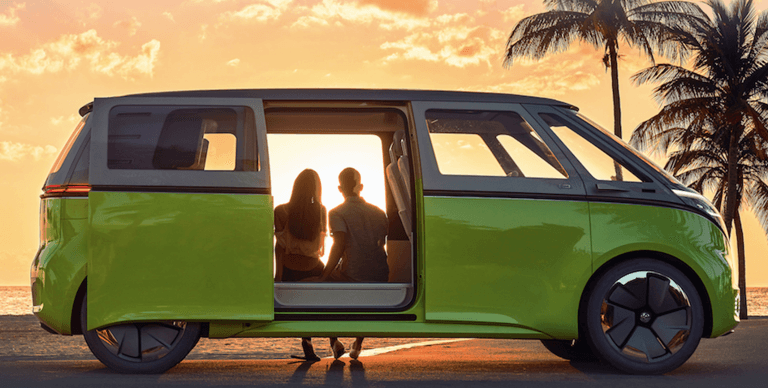
For baby boomers, it offered a lasting connection to 1960s counterculture. For Gen Xers coming of age in the 1980s, it was often the first vehicle teenagers drove. Soon, the Volkswagen Bus (or Microbus, or Camper Van), which first emerged in 1950 and survived during various production phases until the last one rolled off a Brazilian assembly line in 2013, is making a comeback – as an all-electric vehicle.
Last fall, Volkswagen announced that the morphed VW Bus, for now called the I.D. Buzz, will start production in 2022, with sales targeted for the U.S., Europe and China.
The news is a welcome break for Volkswagen, which is mired in the third year of a fog that started in September 2015 when the company’s U.S. division admitted “defeat devices” manipulated many of its diesel automobiles’ emissions readings. Since then, the German automaker has announced settlement after settlement to rectify this public relations nightmare. In striving to move forward, Volkswagen has pledged to expand the production of electric vehicles (EVs) on a global scale, with 16 sites in operation by 2022. The company is even redesigning its logo to align with the upcoming electric age.
That timing will be perfect for Volkswagen if the I.D. Buzz rolls off factory assembly lines as scheduled. With the vast majority of Baby Boomers well settled into retirement by then, with complaint rock-listening, indie-film consuming Gen Xers not far behind, the I.D. Buzz will be primed to take over RV parks, from California’s beaches to even the Big Apple (well, at least the RV park in New Jersey that’s closest to Manhattan).
Volkswagen says the I.D. Buzz could have a 369-horsepower electric motor (the first model in 1950 had only 30 HP), all-wheel drive and a 111 kWh battery pack in the floor of the car’s chassis that will provide a range of nearly 300 miles off a full charge. Using a VW fast-charge system, the reincarnated VW bus should be able to recharge about 80 percent of its energy capacity in 30 minutes at 150 kW. Complementing the I.D. Buzz’s retro feel will be several artificial intelligence features, from facial recognition that will unlock one’s car to allowing for “smart” driving decisions that will make the car safer to drive – and safer for cyclists and pedestrians.
And if delivered as promise, consumers old enough to remember the VW bus and young enough to watch old commercials on YouTube will appreciate the car’s timeless features, from space for small luggage behind the front hood to several interior configurations – including one for “campmobile” sleeping. This bus could spark a “summer of love” over and over again, only with Wi-Fi and FaceTime.
The I.D. Buzz could also be a defining moment for electric cars, as many consumers are still leery of moving away from ICE or hybrid engines. On one side of this equation is the expense of a Telsa – not to mention that company’s current production woes and a new reorganization announced this week. A more affordable EV, GM’s Chevy Volt, often scores positive reviews, but sports a design best described as one that plays safe. A roomy option that revives yesterday’s memories while creating lasting ones for tomorrow may just be what Volkswagen needs to shake off its recent troubles – and inspire consumers to transform their driving habits as we all look to the future of mobility.
Image credit: Volkswagen

Leon Kaye has written for 3p since 2010 and become executive editor in 2018. His previous work includes writing for the Guardian as well as other online and print publications. In addition, he's worked in sales executive roles within technology and financial research companies, as well as for a public relations firm, for which he consulted with one of the globe’s leading sustainability initiatives. Currently living in Central California, he’s traveled to 70-plus countries and has lived and worked in South Korea, the United Arab Emirates and Uruguay.
Leon’s an alum of Fresno State, the University of Maryland, Baltimore County and the University of Southern California's Marshall Business School. He enjoys traveling abroad as well as exploring California’s Central Coast and the Sierra Nevadas.














